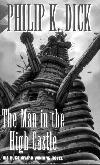|
The Man In The High Castle
The series of events takes place in a world where Japanese are the most respected members of American society. The cultural landscape that Dick creates in TMITHC is intense. It is a culture where the ancient Chinese oracle, the I Ching is consulted for moral decisions. Religion, social customs, art, aesthetics and racism are portrayed in a shockingly real manner. Dick himself used the I Ching to help him write the book, giving the story a spontaneous, open-ended quality. TMITHC won the Science Fiction Hugo Award for best novel in 1962. A great Dick novel that employs many classic Dick themes and writing techniques but might be different than what you'd expect.
Proceed with caution.
Dick's work has been criticized on it's lack of character development. In my humble opinion TMITHC creates some of the most heartfelt characters and situations I've reads in any of his books to date. He refutes this criticism by looking deep into the minds of Mr. Tagomi and Juliana & Frank Frink. It seems that the events which unfold for each of the characters are unrelated however they are all connected by their obsession with The Grasshopper Lies Heavy and the intense moral choices they all must face. As is explained in the excellent essay The Meaning of the Man in the High Castle, each of the characters undergoes a profound change. Tagomi as he realizes that evil is real and comes to terms with his actions, Bob Childan's decision not to sell out his new artistic wares and Juliana's encounter with Hawthorne Abendsen all represent the moral decisions made by those characters. This is a very mature novel by Dick that is very different from his futuristic anything-can happen science fiction stories. It uses many realistic cultural themes. Dick's portrait of a Japanese culture obsessed with American artifacts rings truer than ever in the present time. More than many of his books, TMITHC sums up Dick's fixation with World War II. In typical Dick fashion this novel incorporates many real-world elements that make his work so much more than science fiction. The whole concept of an alternate universe is expanded upon in the chapters Dick wrote for a proposed sequel to TMITHC. Told from a Nazi perspective, these chapters examine the existence of the Nebenwelt, the alternate reality wherein the Allies won the war. Just in these chapters, it becomes clear that the science fiction element is much stronger in his unfinished sequel. It's been said that Dick was unable to finish this novel due to his inability to deal and write about the Nazi mentality. For a look at these chapters and a revealing essay by Dick entitled "Nazism and The Man In The High Castle" take a look at The Shifting Realities of Philip K. Dick - Selected Literary and Philosophical Writings (published posthumously). I felt that the open-ended quality of TMITHC left me hanging. Although the Japanese are warned of the impending German invasion, we never know the outcome. Dick's use of the I Ching is very unique and contributes to the cultural mood of the novel . The way the characters use the I Ching for key decisions reflects a much different morality than American virtue. It allows for many varied interpretations that are not blatantly obvious. Trying to imagine an America governed by such strong oriental philosophy is quite challenging. Modern ideas of American patriotism are dramatically altered as the main American characters in TMITHC have accepted this way of thinking. They are reluctant to challenge the status quo and continue to live as second class citizens. The Americans desire for cultural autonomy is reflected in their obsession with The Grasshopper Lies Heavy. In a U.S. where independence is just a dream, an underground novel represents their only expression of distinctly American values. This is why Juliana is so disenchanted when she meets Hawthorne Abendsen and fins him and his situation different from his expectations. The reality of an America occupied by Axis forces is reflected not as much in the history that would create those circumstances but rather through the eyes and actions of Dick's characters in TMITHC. With all it's dialogue and character interaction, it seems that this story would translate into an excellent screenplay and film that could accurately portray the aesthetics and mood of this Hugo Award winning novel. It wouldn't be true to Dick's vision if it didn't leave the audience guessing.
|

